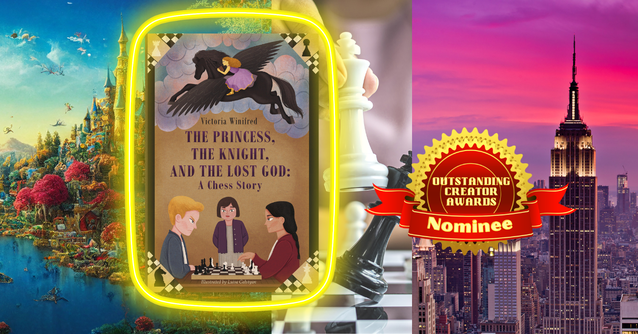|
Score: 93+/100 (9.3+ out of 10)
The Princess, the Knight and the Lost God by Victoria Winifred may not knock you off your rocker or sweep you off your feet. It might not be The Lord of the Rings or A Song of Ice & Fire, but it definitely—most assuredly—stands out as unique and special in the realm of fiction. Who would've thought to write a book that fictionalizes the game of chess? Who would've thought to bring to life the greatest board game of all time via the pages of a novel? We definitely recognize, commend, and appreciate the creativity put on display here. In a Percy Jackson sort of way, it presents huge concepts involving mythology (and chess) in a way that is digestible and not so scary or overwhelming for young people. For young readers, it's practically perfectly. It's exactly what a 11-13 year old might want to read, and exactly what the parent of a young reader would want them to read. It's fun, it's cute, it's interesting, and mostly harmless. There are some references to unsavory activities like running away from home and bullying, some polytheistic & mystical elements, and brief instances of peril, but that's all relatively tame with perspective. If your kids can read Harry Potter, they can safely read this. Let's dive into this book. The Princess, the Knight and the Lost God follows Kassie, a young goddess, princess, and daughter of the reputed god of chess, Mars. Interestingly, Mars is a much kinder and softer version of himself when compared to his portrayal in Roman mythology. He's someone who generally loves and is protective of his daughter and wife as well as being a responsible leader rather than the problem-starter he is often portrayed to be. In this telling, he rules the Chesslings from Chess Mountain, which is a bit like Olympus. It's generally viewed as a better than average place, but it lacks many of the complexities that the Earth or human realm has. In fact, one of the best things about this novel is that it forces the main protagonist, Kassie, to appreciate the nuances and imperfections outside her place of comfort. For example, she learns to appreciate bad weather, rain, and snow. It fascinates her because those aren't things she experienced growing up on Chess Mountain. Another thing she learns to appreciate is that the humans on Earth are less hierarchical and less superficial in their dispositions, attitudes, and behaviors than the Chesslings. Where as the Chesslings are generally courteous and rigid in what they do and say, the humans on Earth are not. She learns about figures of speech, idioms, and even about Santa Claus for the first time! The secret god among man trope is well played in that sense as Kassie must learn that she can't always have her way and can't always be treated and viewed like she's better than everyone else. In another sense, this also makes this a coming of age story. So, how does Kassie end up in this predicament on Earth? Well, it turns out that Mars is an old friend and rival of Euphron, the god of sports, the latter of whom sends his son, Dimitri, to visit Chess Mountain to try his hand at chess. It turns out that Dimitri, who is ironically terrible at sports, is a prodigy at chess. Suddenly, Dimitri goes missing—kidnapped! And, in true Greco-Roman fashion, Euphron blames Mars for this insult and declares war on Chess Mountain. Kassie is threatened with the prospect of being abducted herself, or worse! So, Mars sends her away to Earth (Queens, New York to be specific) in order to keep her safe. With her appearance and name dramatically changed to protect her, the only familiar thing she has beside her memories is her loyal knight and uncle, Maurice, who also takes the form of a human to look after her. Maurice will likely prove to be a favorite character of many readers, and he'll be a consideration for "Best Supporting Character." Essentially, Kassie is in a witness protection program, and we all know that witness protection stories are often fun and full of hijinks! She is forced to live among humans, learning to appreciate them and their foreign ways. Incredibly, she finds that many of them enjoy chess, so she's still able to exercise her fondest passion. Along the way she meets new people including the class bully and chessmaster, Hunter—who proves to be more complex than he initially seemed—as well as interesting and mysterious figures like Mr. Mercury, Abaddon, and Min. Can Kassie adjust to her humble standing among the humans? Is Dimitri safe & will he ever be found? And can peace come between the game-loving followers of Mars and sports-loving followers of Euphron? And is chess a game or a sport? Now, this book is not perfect. There is an instance in which “Kassie” is called “Cassie” and another in which “gaping” is used in place of “gasping.” This happens. It doesn't detract from the quality of the story in any way. The art, similarly, is not the Mona Lisa, but it has the unique charm and genuineness that only comes from hand-drawn art. We greatly appreciate their inclusion. There are even some maps here, a nod to classic fantasy books that often included maps. In closing, we have to bring up one of our favorite aspects of this entire book, and it's the notion of achieving growth and self-fulfillment through patience, hard work, and force of will—the idea that someday a pawn can become a queen. This is definitely a worthwhile read, especially for middle-grade, teen, and YA readers! Check this book out on Amazon!
0 Comments
Leave a Reply. |
Archives
July 2024
Categories |

 RSS Feed
RSS Feed